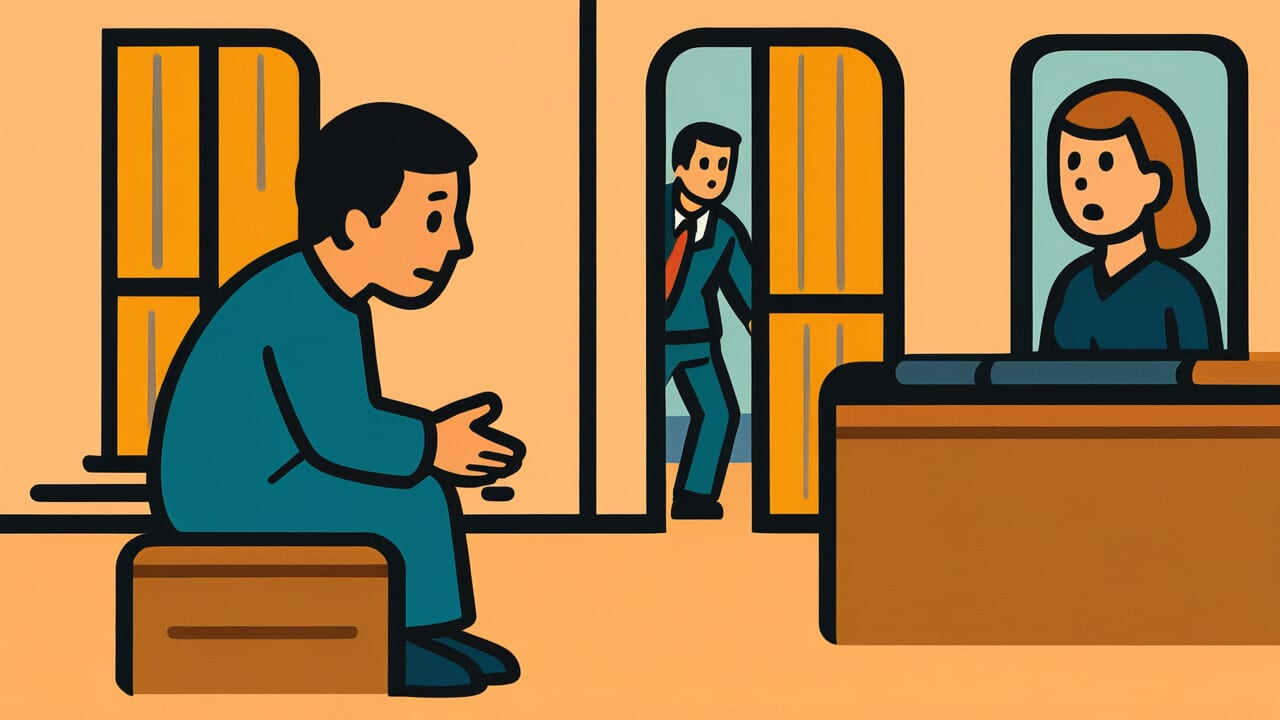How to Read “Waiting is harder than being waited for”
Matareru mi yori matsu mi wa tsurai
Meaning of “Waiting is harder than being waited for”
This proverb means that the person waiting suffers more mentally than the person being waited for.
The person waiting experiences more anxiety, frustration, and worry than someone who is late or running behind schedule.
When you’re waiting, you’re stuck in an uncertain situation. You can only endure it patiently.
All kinds of worries run through your mind. “Did something happen?” “Did they forget about me?”
You check the clock repeatedly. Time seems to crawl by, making you more and more irritated.
People often use this proverb when someone apologizes for being late. The person who waited might say “Waiting is harder than being waited for” to express how anxious they felt.
This expression remains widely understood today. It serves as a lesson about being considerate of others.
Origin and Etymology
The exact first appearance of this proverb in literature is unclear.
However, its structure suggests it came from careful observation of human psychology by Japanese people.
The contrast between “being waited for” and “waiting” is striking. This comparison structure vividly highlights how different emotions arise from different positions in the same situation.
Through the everyday scenario of meeting someone, we can see the deep insight of our ancestors into human psychology.
What’s interesting is that the proverb declares waiting is harder. At first glance, you might think the person being waited for feels more responsible and troubled.
But this proverb states the opposite. This must be a truth that many people have experienced and agreed with over time.
Waiting involves many swirling emotions. There’s anxiety about uncertainty, impatience as time passes, and worry about the other person.
Meanwhile, the person running late understands the situation and is taking action. They’re in a more active mental position.
Japanese people keenly perceived this subtle psychological difference. This simple phrase captures feelings experienced repeatedly in romance, business negotiations, and various human relationships.
Usage Examples
- I waited 30 minutes for my girlfriend, and “Waiting is harder than being waited for” is really true
- She texted that she’d be late, but “Waiting is harder than being waited for,” so I want her to hurry
Universal Wisdom
This proverb offers deep insight into human suffering. It shows that the essence of our pain lies in uncertainty.
The person running late knows the situation. They know where they are and how long until they arrive. They feel in control of their life.
The person waiting is completely passive. They don’t know when the other person will come, if they’ll really come, or what’s happening.
This state of “not knowing anything” is the most unbearable pain for humans.
Throughout human history, we’ve always battled uncertainty. Tomorrow’s weather, harvest yields, the course of illness, the feelings of loved ones.
We’re creatures who feel anxious about what we don’t know. We fear what we cannot predict.
This proverb has been passed down because it goes beyond simple meeting scenarios. It touches a truth that applies to every “waiting” situation in life.
Waiting for test results, waiting for a medical diagnosis, waiting for an important reply. We wear ourselves out more when we can only wait than when we’re actively doing something.
Our ancestors understood this essential truth about human psychology.
When AI Hears This
The pain of waiting comes from “decision-making costs” created by information gaps.
In economics, when one side has information and the other doesn’t, the uninformed side suffers disadvantages. This is called information asymmetry. This proverb perfectly represents that structure.
The person being waited for can freely choose options. “I’ll leave now,” “Please wait 10 more minutes,” or “I’m not coming after all.” They have complete decision-making power.
The waiting person only has two choices: “keep waiting” or “give up and go home.” They can’t even calculate the probability of the other person showing up.
Behavioral economics research shows something interesting. When people wait in situations with possible loss, they perceive the time as 1.5 to 2 times longer than it actually is.
What makes it worse is the sunk cost effect. The waiting person thinks, “Maybe they’ll come if I wait a little longer.”
After waiting 30 minutes, they don’t want to waste those 30 minutes, so they wait even more. Without information, they cannot make a rational decision to cut their losses.
The person being waited for is unconsciously in a position to exploit this psychology.
This proverb recognized the existence of “invisible psychological costs” paid by the uninformed side. It understood this long before economics theorized it.
Lessons for Today
This proverb teaches modern people about the weight of making others wait.
When we’re the ones running late, we tend to think “a little bit is okay.” But the psychological burden on the waiting person is much bigger than we imagine.
This is especially true in modern times. We can always contact each other through smartphones.
That’s why anxiety about waiting without any contact might be even greater than in the past. “They haven’t read my message” or “They haven’t replied” are exactly examples of the pain of waiting.
This proverb teaches you to have a sense of responsibility about time. Keeping your promises about time means respecting the other person’s time.
It means cherishing their heart. If you’re going to be late, contact them early. Just that simple action greatly reduces their anxiety.
At the same time, this proverb sympathizes with the feelings of those who wait. Feeling anxious while waiting shows you care deeply about the other person.
That feeling isn’t weakness. This proverb teaches us it’s human kindness.



Comments